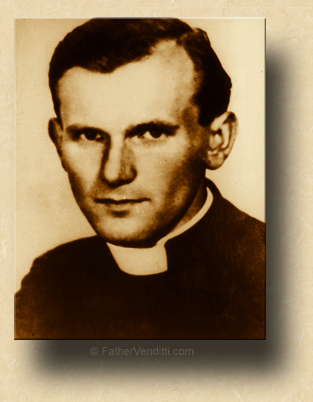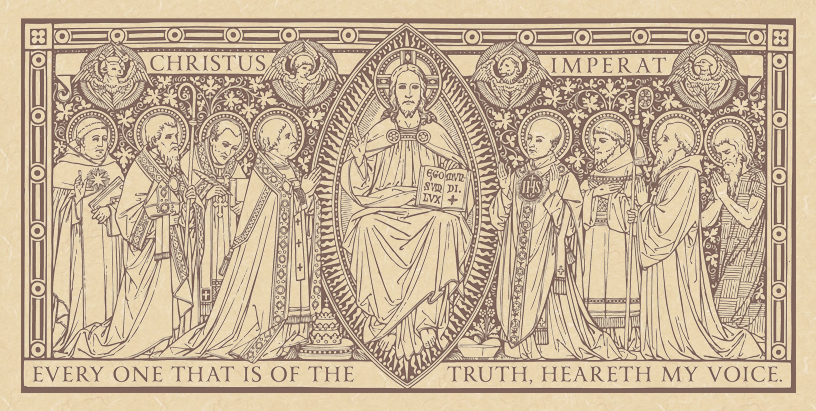Never Trust a Jesuit … Even to Be a Jesuit.
The Twenty-Ninth Thursday of Ordinary Time; or, the Memorial of Saint John Paul II, Pope.
Lessons from the primary feria, according to the ordinary form of the Roman Rite:
• Romans 6: 19-23.
• Psalm 1: 1-4, 6.
• Luke 12: 49-53.
The Twenty-First Thursday after Pentecost.
Lessons from the dominica,* according to the extraordinary form of the Roman Rite:
• Ephesians 6: 10-17.
• Psalm 89: 1-2.
• Matthew 18: 23-35.
The Twenty-First Thursday after Pentecost; the Feast of the Holy Bishop & Equal to the Apostles Abercius the Wonderworker; the Feast of the Seven Children of Ephesus; and, the Feast of Our Holy Father John Paul II, Pope of Rome.
Lessons from the pentecostarion, according to the Ruthenian recension of the Byzantine Rite:
• Colossians 4: 2-9.
• Luke 9: 49-56.
FatherVenditti.com
|
 2:29 PM 10/22/2015 — We celebrate today the Memorial of Pope Saint John Paul II. Canonized by Pope Francis on April 27th of last year, there is no Mass for him in the Missal, so the Mass is taken from the Common of Pastors for a Pope. 2:29 PM 10/22/2015 — We celebrate today the Memorial of Pope Saint John Paul II. Canonized by Pope Francis on April 27th of last year, there is no Mass for him in the Missal, so the Mass is taken from the Common of Pastors for a Pope.
Born in 1920 in Wadowice, Poland, Karol Józef Wojtyla lost his mother at a young age, was raised by his father, and fell under the influence of a small group of Catholic young people who, under the guidance of a very learned and pious layman, based their spiritual life on the works of the Spanish Mystics John of the Cross and Teresa of Avila—whom you may remember from the latter's memorial some days ago, were considered suspect in traditional circles because their ethereal mysticism deviated from the more cerebral method of meditation preached by Saint Ignatius and the Jesuit retreat masters (the Jesuits succeeded in keeping their works banned from the seminaries for over a century). He went on to study for the secular priesthood in an underground seminary operated by Prince Adam Stefan Cardinal Sapieha, the last of Poland's bishops to come from the nobility, and was ordained for the Archdiocese of Krakow. He studied and taught philosophy at the university level as a young priest, and served briefly as an auxiliary bishop before succeeding Cardinal Sapieha as Archbishop of Krakow. He was elected Pope on October 16th, 1978.
He's remembered by us for a lot of things: the Catechism of the Catholic Church, the revised Code of Canon Law, the Third Edition of the Roman Missal, the expansion of the Holy Rosary to include the Luminous Mysteries, just to name a few. He wasn't a perfect pope by any means: he had a blind spot regarding sexual abuse by priests, probably because, in his native Poland, an accusation of sexual abuse was the primary means used by the Communists to get rid of priests who annoyed them, so he had a hard time taking such accusations seriously.
His twenty-seven years as pope left behind a voluminous amount of catechetical teaching, delivered in his many encyclicals and apostolic exhortations, but also in his weekly General Audience addresses, which he raised to a whole new level of importance, leaving the popes who followed him playing catch-up. It's not for the present generation to say, but I suspect that, in the decades and centuries to come, the importance of Pope Saint John Paul's catechetical influence on the Church will one day cause him to be regarded as a Doctor of the Church. Some people are already fond of calling him “John Paul the Great,” which is very improper: the title “Great” has only been bestowed a few times on Pope's who have been canonized, and never sooner than three hundred years after they're dead.
Every priest feels a spiritual and intellectual bond with whoever was pope at the time he was ordained, and for me that pope was Saint John Paul II; so, it was important to me to celebrate his memorial today even though its celebration is optional. As with most of the saints, most of us will venerate him for different reasons. For myself, his most important contribution to the life of the Church is the one thing that most people know nothing or care nothing about: his lifting of the veil of suspicion from the works of the Spanish Mystics, paving the way for Teresa of Avila, John of the Cross and other Carmelite spiritual authors to offer an alternative to the rigid spiritual program imposed on the Church by the Jesuits and considered infallible for so many centuries (and it's ironic that the pope who canonized him was a Jesuit). For others, I suppose, his unwavering witness of persevering in his papal duties until death, even while in the throws of Parkinson's Disease, may be the most inspiring thing about his life; most certainly he is a saint to pray to for anyone suffering from painful and chronic illness.
In any case, on his memorial today let us all pray to him for Holy Mother Church, to whose patrimony of teaching Saint John Paul added with great clarity and zeal, and who's example of priestly life and service has inspired many to follow him into the sacred ministry, yours truly included.

* In the extraordinary form, on ferias outside of privileged seasons, the lessons from the preceding Sunday are repeated.
|

